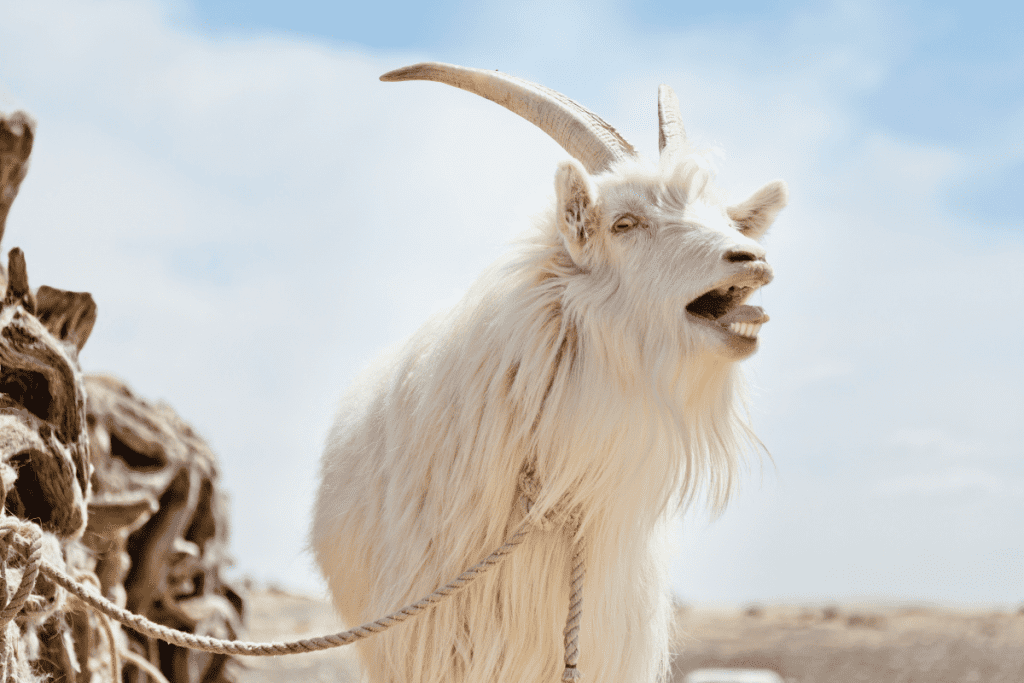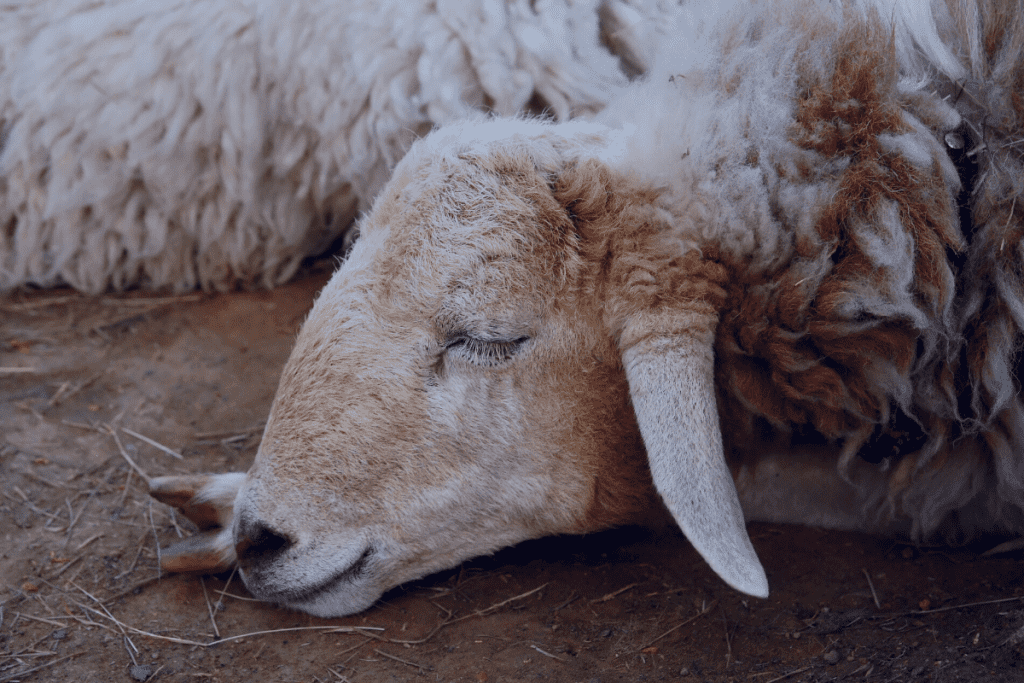Sheep farming has become increasingly popular recently, as they are raised for their meat, milk, and fiber.
Sheep are low maintenance and do very well in small areas, making them especially appealing to backyard farmers.
The main concern of raising sheep in a residential area is getting noise complaints from a neighbor.
But, do sheep make a lot of noise?
Sheep are not typically loud, but they are social herd animals, and they use a variety of sounds to communicate their needs. When sheep are noisier than usual, there is usually a good reason for it, such as hunger, being in a cramped space, loneliness, fear, or injury.
Sheep also frequently communicate with each other and are particularly loud when they are in heat.
The overall noise level of a sheep depends on the breed and the individual animal.
Read on to learn why sheep make noise and how to keep them quiet.

Table of Contents
ToggleWhy Do Sheep Make Noise?
Most people are familiar with a sheep’s usual “baa” sounds.
However, there are times when sheep will bleat very loudly, which generally indicates they are unhappy about something.
If your sheep are noisier than usual, it is best to investigate to ensure the animals are not injured or in danger.
Below are some of the most common reasons sheep will make more noise than usual.
They Are Hungry
The most common noises you will hear from your sheep are their calls for food.
When the sheep are not in the pasture, they rely on you as their food supplier.
If you are late at feeding time or the sheep’s food source has run out, they will bleat loudly to tell you it is time for them to eat.
There Is Not Enough Space
If there are too many sheep cramped together in a pen, it may cause an issue in herd rank.
Like most livestock animals, sheep have a herd hierarchy and will follow the most dominant animal in the flock.
If there is a ram in the herd, he is usually the designated leader.
The leader is the most dominant female in the flock when no ram is present.
Sheep may become aggressive and make a lot of noise if anything disrupts the herd dynamic.
Being crowded in a small pen or introducing a new sheep to the flock will cause a change in the herd hierarchy.
Further Reading: All the reasons sheep and rams headbutt
They Are Lonely
When sheep become separated from the rest of the herd, they will bleat loudly in search of their mates.
Clingy lambs will become especially noisy if they cannot find their mother.
Having a single sheep on a farm almost guarantees the animal will be noisy.
It is always best to keep a herd of at least 2-3 sheep to keep them from being lonely.
They Are Scared or Injured
Sheep are prey animals and will bleat cries of fear if they sense a predator nearby.
Sick or injured sheep cry out more than usual, either because they are in pain or hungry from being too ill to eat.
Ewes also bleat and make a lot of noise when they are giving birth.
They Are Communicating with the Herd
Sheep are almost always communicating, but they are louder in certain situations.
If there is a predator nearby, a sheep will bleat a warning to the rest of the herd to alert them of the danger.
A sheep may also sound a loud call letting the others know it has found a new food source in the pasture.
Sheep mothers will baa to their offspring, so the lambs get used to the sound of their voice.
When a lamb becomes separated from its mother, the dam will call out loudly so her baby can locate her more easily.
While it may be difficult for a human to discern individual sheep voices, each one is identifiable to the rest of the flock based on its unique sound.
They Are In Heat
When sheep are ready to mate, they tend to make a lot of noise to let nearby mates know they are available for breeding.
Ewes go into a heat cycle about every 17 days, lasting from 24 to 36 hours.
In addition to making a lot of noise to attract a mate, a ewe will tend to spend a lot of time close to a ram when she is ready to breed.
Do Sheep Make Noise at Night?

Sheep do not typically make a lot of noise at night, but when they do, there is a reason for it.
If the sheep do not feel secure or sense a predator nearby, they will bleat loudly as an alarm to the rest of the herd.
Since visibility is much lower at night, ewes and their lambs will call out to each other if they are separated.
Injured or sick lambs will make a lot of noise at night, and it is not entirely unusual for a ewe to give birth after dark.
Any loud noises coming from your sheep at night must be investigated in case the animals require medical attention.
What To Do About Noisy Sheep
If you are worried about nearby neighbors filing noise complaints because of your loud sheep, you will need to remedy the problem.
Deciding whether or not to rehome loud sheep is often difficult for a farmer.
Fortunately, there are several methods for keeping noisy sheep quiet.
Stick to a Regular Feeding Schedule
Sheep are very vocal when hungry and know it is feeding time.
This is why it is essential to maintain a regular feeding schedule for your sheep.
Feeding your sheep only when they are noisy reinforces their loud behavior.
By sticking to a regular feeding schedule, the sheep will feel more secure about their food supply and less likely to fuss about it.
Avoid Overcrowding
Generally, each sheep in your herd should have at least 15′ square feet of space in the pen.
For pasture feeding, you must provide a minimum of half an acre of land for each sheep.
When sheep are not provided with adequate space, the herd makeup of the flock will change.
The sheep may become more aggressive and fight over space and food.
Illness is also more likely to quickly spread through the herd if the sheep are kept in a cramped area.
Providing your sheep with adequate space will reduce aggression and the spread of disease, resulting in a quieter flock.
Create a Calm Environment
It is crucial to ensure your sheep feel secure by creating a calm environment.
When sheep are kept in a pen during the winter, they tend to become restless and may be noisier than in the pasture.
Check the pasture fencing and the sheep pen for any areas a predator might be able to break through and repair these issues immediately.
Keeping anxious or newly introduced sheep in a separate pen until they are used to their environment will also keep the rest of the herd calm.
Treat Sick or Injured Sheep
Sick or injured sheep will make a lot of noise, and their constant bleating may also stress out the rest of the herd.
Regularly monitor your flock for any health issues or injuries, and provide medical treatment as soon as possible.
Choose a Quieter Sheep Breed
Sometimes, no matter what you do, your sheep will continue to be very loud.
This loudness may have to do with the breed of sheep you raise.
While the noise level of domestic sheep greatly depends on the individual animal and how it was raised, the Jacob breed is known for being loud.
Some quieter sheep breeds include:
- Katahdin
- Finn
- Icelandic
- Southdown
- Welsh
Consider choosing one of these more docile breeds if you are concerned about how much noise your sheep will make.
How useful was this post?
Click on a star to rate it!
We are sorry that this post was not useful for you!
Let us improve this post!
Tell us how we can improve this post?
